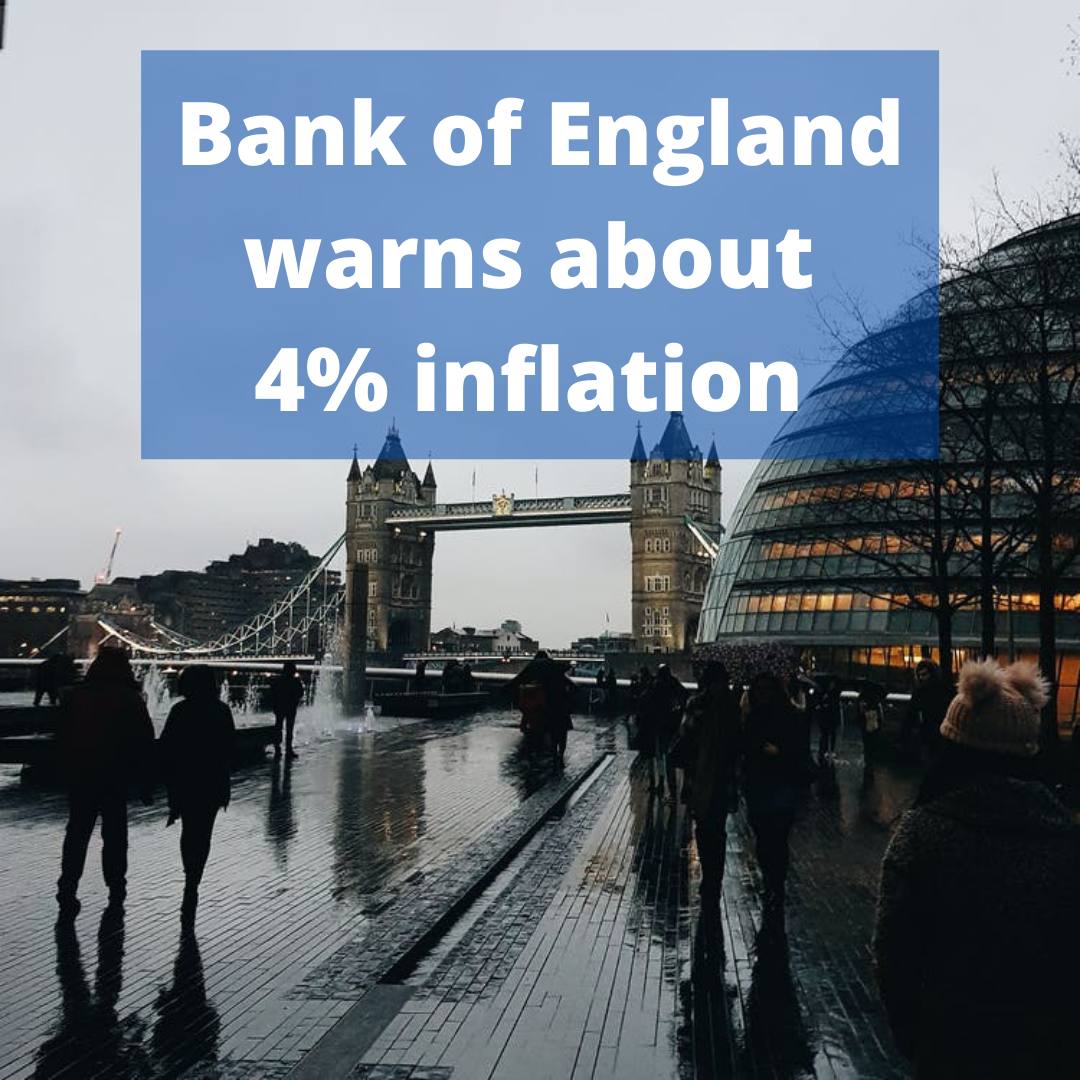Inflation is forecast to be 4% this year as the UK's recovery from the pandemic accelerates at a rapid pace, the Bank of England said, hinting that a modest increase in interest rates next year might be needed to keep rising prices in check.
The central bank's Monetary Policy Committee (MPC) said most of the economy is open and companies are reporting strong sales. The economy will grow 8% in 2021, above May's forecast of 7.25%, and will return at its pre-pandemic level activity for the end of this year, not for the spring of 2022.
Keeping the current base rate at 0.1%, MPC predicted that the rise in inflation is likely to be temporary, as the current rise in prices for energy and imported goods began to decline, pushing price growth lower to the next year target of 2%.
However, interest rates are likely to rise at some point during the next 12 months to ensure that inflation continues to decline, although any increase will be moderate to support the recovery.
“CPI inflation has risen markedly, surpassing the Monetary Policy Committee's target of 2%, and is expected to temporarily rise to 4% in the near future. Growth largely reflects the impact of the pandemic as the economy recovers,”- the Bank informed in the latest monetary policy report.
“This has resulted in higher energy and goods prices, which in turn reflects rising commodity prices, transportation bottlenecks, production constraints, and strong global demand for goods. Therefore, inflation above the target level is expected to be temporary, as commodity prices stabilise, the supply deficit will decrease and global demand will change,” - they added.
Some city analysts said a quarterly review of the bank's economy showed pressure within MPC to increase borrowing costs earlier than expected, and possibly as early as next spring.
"Unless there is another major wave of COVID-19 in the winter and the economy performs as forecast by the Bank, the first-rate hike is likely to occur in the spring or early summer of next year," - said Ian Stewart, chief economist at Deloitte consulting.
Others said any monetary tightening could be delayed until 2023. Marcel Alexandrovich, an economist at investment bank Jefferies, said officials wanted to remain flexible and that "it is unlikely that the timing and extent of future rate hikes will be seriously discussed. It won't start before next year. "
The optimistic recovery estimates that unemployment will peak at the current 4.8%, which means that the end of the holiday regime in September will not have a negative impact, according to the MPC. Wage growth, which it said averaged 3.5%, will also remain significant.
Michael Saunders, a former investment bank economist and one of the nine members of the MPC, argued that the bank should take a tougher line on inflation now that the recovery is underway. He voted to limit the Bank of England's quantitative easing program to £895bn, unlike the rest of the committee, which wanted to complete the bank's stimulus plan by the end of the year.
However, while MPC members rejected the immediate policy change, they agreed to begin the QE cuts by not reinvesting the bonds that mature after raising the base rate to 0.5%, and plan to begin reducing stocks to pre-pandemic levels. Later it reached the base rate of 1%.
“The committee believes that if the economy develops broadly in line with the core forecasts in the August monetary policy report, a modest monetary tightening will likely be required during the forecast period to ensure that the inflation target remains at the medium term,” - the message says.
Hugh Gimber, the global market strategist at JP Morgan Asset Management, said that the UK's internal outlook was good, but "the uncertainty surrounding the Delta option and the phasing out of the layoff scheme" made policymakers wary of any premature end of support.
The bank must complete its current quantitative easing program by investing the last £50bn in the economy by the end of the year.
The new growth forecast for 2021 will make it the fastest since 1941 when the British war machine was at full capacity during World War II and GDP grew by 8.7%.
He predicted that UK GDP rose 5% in April-June, more than forecast three months ago, as the relaxation of quarantine restrictions spurred growth. But he also warned that recent developments in the pandemic mean growth in the third quarter of 2021 will be “slightly weaker than expected in the May report” at 3%, indicating “a sharp increase in the number of people who wanted to isolate temporarily” since their last meeting at the end of June.
Threadneedle Street officials said the rapid recovery, coupled with shortages of raw materials and energy prices, would push inflation down to 4% for the first time since 2011, when it hit 5%, before returning to zero, mainly due to fluctuations in oil prices.
MPC also said it is aware of Rishi Sunak's statements that the Treasury will announce plans to cut government spending next year in the fall, which will reduce the economy's growth potential.
Ruth Gregory, an economist at consulting firm Capital Economics, said the Bank used its economic forecasts to convey a more optimistic message about the economic outlook.
“In fact, while the economy is expected to continue to return to its pre-pandemic peak in the fourth quarter of 2019 in the fourth quarter, the Bank now believes that instead of peaking at 5.4% in the third quarter, the unemployment rate peaked,” said he.
“Speaking of the mechanism of tightening policy, this is another sign that tightening is getting closer,” he added.
Please contact Persona Finance [Enquiries@Personafinance.co.uk] for accounting and business guidance.



